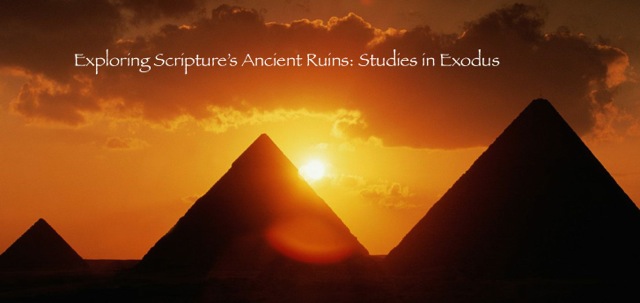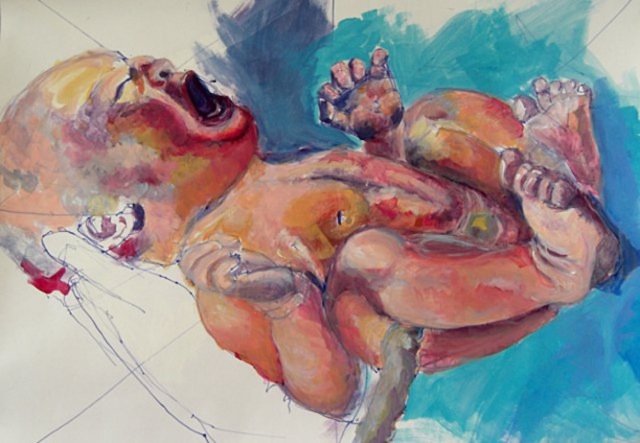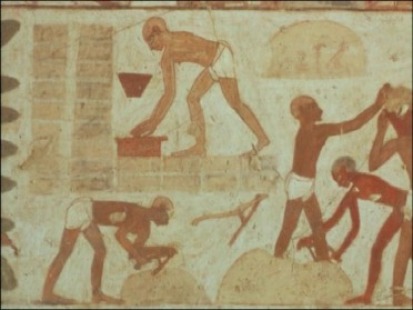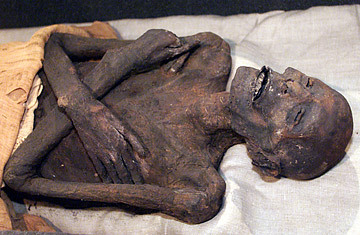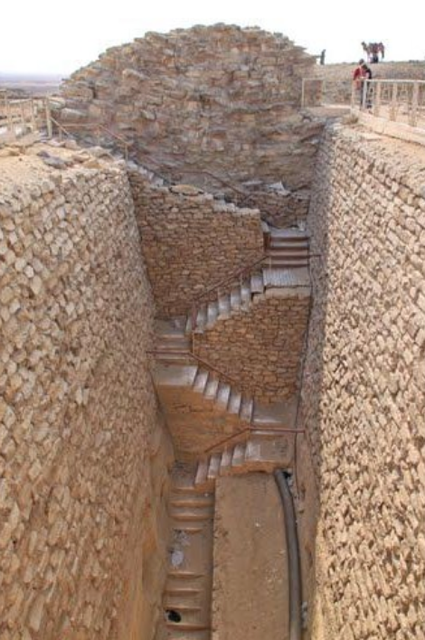©1998-2014
Fellowship @ Cross Creek
Life of Moses
Lesson 3: “ Just One More Thing”…
Ex 2:1-10
11/24/02; Edited: 8.17.14
Thought to consider: Quite often, we want our salvation or deliverance from life and its struggles and challenges to be all spelled out for us. We want to see daylight. And yet, that is NOT often the case, how it is. It is daily obedience; daily trust; daily seeking the Lord; daily seeking the Spirit’s leadership through some of the most challenging and complex double binds that a person could imagine. Whether we like it or not, life is a serious of ones and zeros…a series of choices…choices with consequences we are not always fully aware of. We must choose and live. Choose and live. Choose and live out the consequences of those choices, which mean more choices, some of which are okay, and some of which we would have rather avoided.
What do you do when you are not sure what to do? What if the choice is really really tough? What about now? Are you in jam now? A tight squeeze? Is there hope? There’s always hope. Consider Moses’ mother’s choices. Did she choose desperately? Perhaps? Wisely? It sure would seem so. How did she do? Was she brave? Were there risks associated with her choices? Absolutely. But each choice bought her precious time. Did she have everything figured out? Doubtful. Was she thinking? Yes. Praying? It doesn’t say. We might assume so. Was God involved? It would certainly seem so. Do you think God cares about us and our decisions too, regardless how desperate those choices seem to be? I think so.
Do you think you could present one of those choices clearly to God right now? And could he inspire you with just the next step, out of possibly many steps, turning in to what could be your deliverance? I think so. Why don’t you try him out and see what comes of it? Intuitive or counter-intuitive Spiritual dependence upon God, even if imperfectly interpreted by you?
Pray
Read the Passage three times…
Ask questions…
Exod. 2:1 Now a man of the house of Levi
married a Levite woman,
What is Levi? Is that a jean or a tribe?
2 and she became pregnant
and gave birth to a son.
When she saw that he was a fine child,
she hid him for three months.
What determined that he was a fine child? Did he look good? Was he healthy? How did she hide him for three months? Did no one hear the baby crying? Obviously the Israelites wouldn’t turn anyone in. What was going on in the mother’s mind? the father’s? Were others doing the same thing or only this family?
3 But when she could hide him no longer,
she got a papyrus basket for him
and coated it with tar and pitch.
Then she placed the child in it
and put it among the reeds
along the bank of the Nile.
What is a papyrus basket? A reed basket? Was the child not in danger of alligators or something? Was the Nile at flood stage? How big is the Nile? Is it gentle near the edges? How long could this have lasted? At some point this child would have rocked the basket or tried to crawl. This had to be a temporary solution.
4 His sister stood at a distance
to see what would happen to him.
How far away? What did she think would happen to him? What about nights? Was this just during the day? Would she hide the baby in the basket and transport it back and forth to their home? How old was his sister?
5 Then Pharaoh’s daughter went down to the Nile to bathe,
and her attendants were walking along the river bank.
She saw the basket among the reeds
and sent her slave girl to get it.
Coincidence or God’s providence? Pharaoh’s daughter just happens to choose the one place where this baby was floating? Or was this intended by his mother?
6 She opened it and saw the baby.
He was crying,
and she felt sorry for him.
“This is one of the Hebrew babies,” she said.
So obviously she knew what was going on—that the Hebrew children were being thrown into the river. No doubt this one is one that the mother could not bring her heart to drown. How awful a thought! How awful an experience! But one mother was courageous and shrewd enough to try something different. Does God reward her for this or was Moses always chosen, even before the womb and that is why he was protected? While I would like to think the former, my theological foundation says the later.
7 Then his sister asked Pharaoh’s daughter,
“Shall I go and get one of the Hebrew women
to nurse the baby for you?”
Now where does she pop up from? Out of the bushes or reeds, along the bank? Were there other people around? Did Pharaoh’s daughter suspect something or did she know? I can’t help but think she knew what was going on, but because her heart went out to this infant (like one does for a puppy) she spared this child and this family from the horrors of what others were going through because of her father.
Obviously, Pharaoh’s daughter, if not having any infants of her own, which is not an unreasonable assumption, was in no position to nurse this child.
Which leads to other questions such as: how old was Pharaoh’s daughter? How many daughters did he have? How many wives? More than one? Many children? Was this one married? Was she unmarried? Was she young? How she lost a child in a miscarriage? Lots of things could be going on here.
8 “Yes, go,” she answered.
And the girl went and got the baby’s mother.
Hallelujah! What an amazing “yes”! What a run! What an answer to prayer—can we assume that Moses’ mother had prayed? I think this is a safe assumption. Perhaps even placing the infant in a basket along the river was an answer to prayer, although the short-term reasoning is quite understandable. The infant is away from the population.
9 Pharaoh’s daughter said to her,
“Take this baby and nurse him for me,
and I will pay you.”
So the woman took the baby and nursed him – a double bonus! Is God not amazing? Not only does she get her child back in freedom but, because now it is the Pharaoh’s son, she is getting paid for her services. God has a special purpose for this child. Can you imagine the feeling Moses’ mother felt everyday as she held her child in her arms and gently nursed him? My friends, that is grace. That is thanksgiving.
10 When the child grew older,
she took him to Pharaoh’s daughter
and he became her son.
She named him Moses, saying,
“I drew him out of the water.”
This must have been tough. Did Moses’ family tell him who his real parents were or to protect him, did they not reveal his identity? But if one considers the alternative, then I assume this was worth it. Major question: at what age did she take him back to the princess? After weaning? 5 years of age? 10? How old was he?
Whos? A man of the house of Levi, a Levite woman, a son, his sister, Pharaoh’s daughter, her attendants, Hebrew babies, one of the Hebrew women, Moses.
Wheres? hiding (implied), in the papyrus basket, among the reeds along the bank of the Nile, at a distance, to the Nile, along the river bank, take this child, to Pharaoh’s daughter, out of the water
When’s? now a man, when she saw, three months, but when she could, then she placed it, then his sister, when the child grew older
Whats?
• A Levite man and woman marry and have a child.
• She hides him for three months instead of throwing him into the river.
• Then she prepares a waterproof basket to place the child in and places the infant in the basket along the river’s edge, along with his sister hiding in the reeds to watch out after the child.
• Pharaoh’s daughter appears, sees the child and feels compassion for it.
• Out of the reeds steps the child’s sister who offers to run and get a Hebrew woman to nurse this child.
• Pharaoh’s daughter replies affirmatively.
• The daughter retrieves the child’s mother.
• Pharaoh’s daughter hires the mother to look out after the child.
• When the child grows older, the child’s mother takes the child to Pharaoh’s daughter and she adopts him as his own and names him Moses because she drew him out of the water.
Summary: Grace. Via a protectively, shrewd mother, a waterproofed basket, a pharaoh’s daughter, a vigilant, quick-thinking sister and the grace of God, the baby Moses, who will grow up to be used by God to liberate his people from slavery is spared certain death.
And not only is he spared, he is adopted into royalty–into the family of the very man who was seeking his life.
What a story!
Whys? What do I learn about God? Life? People? Myself?
• God is incredible–how he can manipulate the events of life to provide for his children.
• Nothing is by accident. Nothing.
• If God can care for Moses, then he can care for me.
• God desires to care for us in a royal manner; we are royal priests in the household of God (1 Peter 2; Rev. 1), just as Moses was a grandson of the Pharaoh.
• God desires to protect us as he did Moses, though sometimes it is not in what we might consider a normal or traditional manner. He does this so that there is no doubt that he is the author of our salvation; so that we might trust and believe in him.
• Moses’ mother was both courageous and shrewd. God no doubt honored her shrewd courageousness, even if the plan was but a short term solution.
• Although the child’s older sister played a lesser role, it was momentarily of utmost value. She was vigilant and when the moment came, she was lightningly shrewd. She saved her brother’s life. Ultimately she saved the life of her entire nation because it will be this baby that God raises up to lead Israel out of slavery and to the promised land.
• Pharaoh’s daughter felt compassion and acted generously. She acts as a type of Christ rescuing us from our certain death down at the river.
So What’s? (Prayerfully connect a specific personal struggle to one of the above truths or principles and be willing to share or confess it with the group.)
Thanksgiving (2014): Another good Sunday…by God’s grace. Returned to (Jesus) Yah-Saves’ words concerning the Stories of Man’s Sin and God’s Deliverance from Man’s Sin in John 12. The basic big idea as Jim Elliot’s revised qoute…He is no fool who gives up what he cannot keep for that which he cannot lose. No doubt, in reaction to her brother having received the impossible, life after death, Mary breaks and pours a precious vail of imported oil, valued at a years’ wages, upon the head and feet of our Lord. Mary got it. She was in the presence of God in the flesh. Nothing would have been too invaluable for her to have shown her love and devotion for Christ. And nothing is too invaluable for us to demonstrate our confidence in him as well. That is the definition of worship.
Also, we realized an over eight year dream on Sunday when we found and purchased a truck that met the description I had been looking for – for quite some time… a four-wheel drive, five-speed 2003 Toyota Tacoma with extra cab and nice camper shell. One of its previous owners served oversees for four years, so it only has 112,00 miles. These trucks were made to go over 200,000 easily. We shall see. At least we have a four-wheel drive for this winter. Thank you, God. In addition, Rhonda and I got to know one of the CRU gals from Russia on the trip there and back. What a joy!
Finally, one of the men who have had the most positive, Spiritual impact on my life for the past twenty plus years passed away on Sunday. He was 87, and his name was Jim Perry. He was a gift from God, but not just for me, but literally for thousands of others. He was a man’s man who was not afraid to say he prayerfully sought “the leadership of the Holy Spirit.” While others might have thrown around WWJD, meaning what would Jesus do? repeatedly, I would ask myself, WWJD…what would Jim Perry do? because Jim got me into the ballpark of what Jesus might do. Actually, Spiritually imititating either would be very difficult, but Jim, in the way that he lived and sought the Spirit’s leadership, was a living embodiment of someone who lived WWJD. My reward…besides having become more of a godly man because of Jim, was having the honor, or responsibility, of spending time with his immediate family and officiating Jim’s memorial. Perhaps I may have the priviledge of experiencing other honors in my life, but to have preached this man’s memorial, it may be the highlight. His matchless legacy, including his Christ-like dependency upon God’s Spirit, will live on through countless lives and souls that Jim touched for the kingdom of God.
2002 Application…
My struggles: For those following the weekly trials and tribulations of “the Osbournes” i.e. “the Crosses” on LC1 (instead of VH1), I did not pick up my rocks last week. At some point in time, I ran out of time. On Saturday, I took Amanda on a surprise trip to see the Razorbacks play. She loved it.
Of what I can remember, it was still a good week and I got a lot done. It has carried over on into this week as well. But each week hangs in the balance, especially Wednesday and Thursday with respect to getting the extras done. Rhonda is being patient with me to fix Tod’s fallen shelves (he hung them last time) over the washer and dryer. Just a lot to do and not enough of me to go around. I am still flirting with the idea of getting over to the church and picking up some rocks and planting some grass Wednesday and Thursday.
So struggles are primarily the same: balancing the variety of demands. In the midst of everything else, I have a wedding rehearsal, ceremony and reception going on this weekend. As much as I love the premarital counseling, everyone knows how much I LOVE doing the social/ritual aspects—NOT!
Principles: Despite not being able to solve problems completely, sometimes all you have is a tarred papyrus basket down at the river.
Prayerful application: In other words, do the best you can and quit whining. Even if the solution is a short-term solution, do the best I can and leave the rest to God. So even if I can only do a little bit, do a little bit—buy some time until God can send the Pharaoh’s merciful daughter down to the river and rescue my baby. In the meantime, it doesn’t hurt to be hiding in the reeds, waiting for my deliverer.
Try to do something at the church and try to do something with respect to Rhonda’s shelves that can never seem to stay up. And whatever I can fit in, will be better than nothing.
2014 Application…
Struggle: Tired. Ministering to the Perry family was about a full day and half commitment. I felt I did pretty good with my ministry to the family. Eulogy or message, was pretty good. Not my best, but certainly not my worst. It could have been tighter. Still I know it meant a lot to the family and they repeatedly said so. Jim meant so much to my life, I would have preferred to have nailed his memorial perfectly, but alas, I am but a feeble sinner. I know I and many many others loved and looked up to him. I was a very late PeeWee Football Pirate in the making.
Now it’s time to get back into a different groove. It would be nice to be better prepared for Sunday and not to experience all the last minute angst. Also, seeking the balance between the weekly ministry chores and writing. And finally, watching my flock a little more closely these days as we exit the summer vacation season and return back to school.
Truth: Survive. Jesus’ (Matt. 6) and Gen. Moore’s “Just one more thing…” strategy, or as Gen. Hal Moore would say, “Three strikes in baseball, and you are out; not so in the game of life. There is always one more thing you can do.” Think of it; pray it and do it. And then after that, when you think that there is nothing else you can do, think of “one more thing” and do it, and so on and so forth. There’s always one more thing. Think of it and do it. That’s exactly what Moses’ mother and sister were doing. It saved his life, and then God used this life to save a nation. Amazing!
Leadership by Gen. Hal Moore…https://www.youtube.com/watch?v=wGNxHMFjigA
Application… Play the game as it is being dictated to me. Last week, it was finding and buying a truck. This week, it was honoring someone who was argubly, the greatest and most practical Spiritual impact on my life, and certainly as a young man. Now, it is to finish this study revision; do some counseling tomorrow and prepare for Sunday. One day, one moment, one struggle, one prayer at a time.
Your struggle?
Principle?
Prayerful application?
What about your students? What are some of their current struggles?
Which principles seem to relate?
How could God prayerfully apply these truths to their lives? (Just try a few in your preparation…then try leading the application in that direction. It may go another direction. Be sensitive to God’s leading among the group.)
Scripture quotations, unless noted otherwise, are taken from the Holy Bible: New International Versio‚ NIV‚ Copyright 1973, 1978, 1984, International Bible Society. Used by permission of Zondervan Bible Publishers. All rights reserved.
